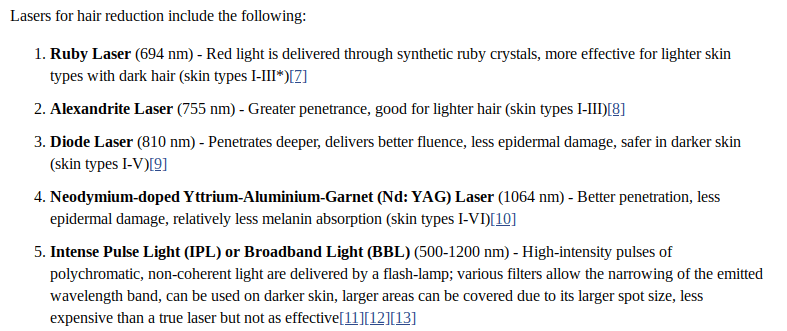Laser treatments for dark skin tones require careful consideration, as individuals with more melanin are at a higher risk of complications such as hyperpigmentation and scarring. Traditional laser types and therapies were initially designed for lighter skin tones. These lasers can absorb too much melanin from darker skin, leading to adverse effects.
However, advancements in technology have introduced laser treatments specifically designed for individuals with darker skin tones. In this post I discuss some of the best laser types for dark skin.

Laser Types for Darker Skin Tones
- Nd:YAG Lasers:
- How it works: Nd:YAG lasers use a neodymium-doped yttrium aluminum garnet crystal as the laser medium. They emit light with a longer wavelength of 1064 nanometers, which allows for deeper penetration into the skin without significant absorption by melanin in the epidermis.
- Suitability: Nd:YAG lasers are particularly suitable for individuals with darker skin tones because the longer wavelength minimizes the risk of hyperpigmentation and other adverse effects. Makse sure to see my list of ND:YAG laser brands.
- Uses: Common applications include hair removal, treatment of vascular lesions (such as spider veins), and skin rejuvenation. This laser is versatile and widely used in dermatology.
- Diode Lasers:
- How it works: Diode lasers use semiconductor technology to generate a coherent beam of light with a wavelength typically ranging from 800 to 810 nanometers. This wavelength is effective for targeting melanin in hair follicles while minimizing impact on surrounding skin.
- Suitability: Diode lasers are considered safe for individuals with various skin tones, including darker skin. One can also use blend diodes these days, although only on skin types III-IV on the Fitzpatrick scale and nothing higher.
- Uses: Diode lasers are popular for hair removal on all skin types. They are also used for skin rejuvenation, with applications such as reducing pigmented lesions and improving overall skin texture.
- Fractional Laser Therapy:
- How it works: Fractional lasers create microthermal zones in the skin, leaving areas of untreated skin between them. This promotes faster healing and reduces the risk of complications.
- Suitability: Fractional lasers, especially those with longer wavelengths, are considered safe for dark skin tones. They provide an effective solution for addressing various skin concerns while minimizing the risk of hyperpigmentation.
- Uses: Fractional lasers are employed for treating acne scars, fine lines, wrinkles, and overall skin texture improvement. They can be ablative or non-ablative, depending on the specific skin concern and the depth of treatment required.
- Erbium YAG Lasers:
- How it works: Erbium YAG lasers use a crystal medium that produces light at a wavelength of around 2940 nanometers. They are often used for ablative skin resurfacing.
- Suitability: Erbium YAG lasers are considered safer for dark skin compared to some other ablative lasers, as they have a shorter wavelength that is less likely to be absorbed by melanin.
- Uses: Skin resurfacing with Erbium YAG lasers can address concerns such as scars, fine lines, and wrinkles. The controlled removal of outer skin layers stimulates collagen production and rejuvenates the skin.
Note that Alexandrite lasers should not be used on people with darker skin. Intense Pulsed Light (IPL) products are also usually not suitable for people with darker skin. However, several IPL products can be used for at-home body hair removal in people with skin types III and IV. Moreover, the Me Sleek IPL and RF hair reduction device is suitable for all skin types.
When considering laser treatments for dark skin tones, it is essential to emphasize the importance of an individualized approach. Factors such as the patient’s specific skin type, the condition being treated, and the expertise of the practitioner play significant roles in ensuring both safety and efficacy.
Always consult with a qualified dermatologist or laser specialist who has experience working with diverse skin types to determine the most appropriate treatment plan for your specific needs. Additionally, adherence to pre- and post-treatment care instructions is crucial for minimizing potential side effects and optimizing results.